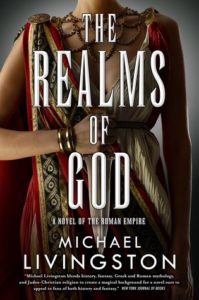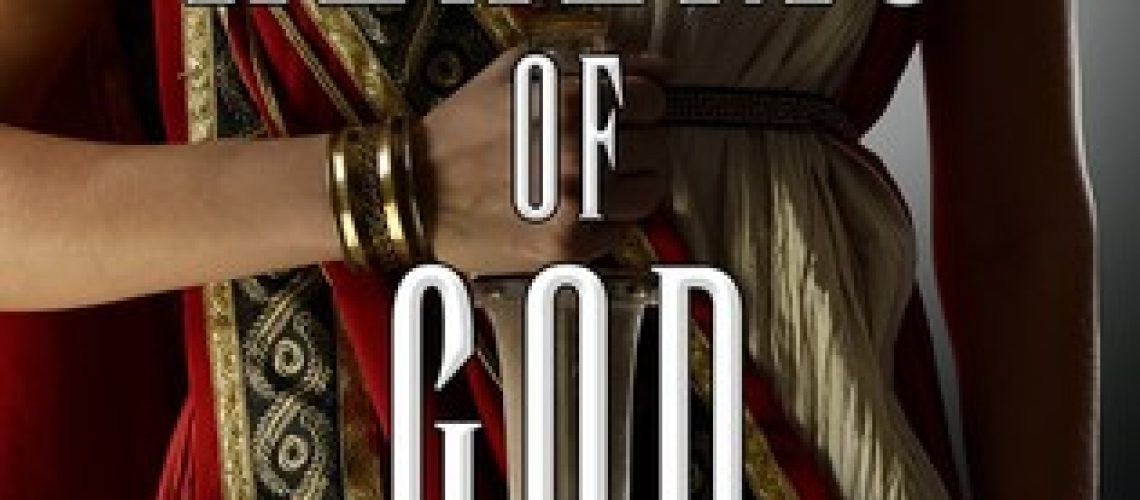Drawing together strands, plots, and conflicts from the first two novels, The Realms of God winningly completes Michael Livingston’s Shards of Heaven trilogy.
In the Shards of Heaven series, Michael Livingston has been weaving the real-life history of the early Roman Empire with magic and myth in a potent combination. Starting with The Shards of Heaven and through The Gates of Hell, the author has been telling the story of the Shards, pieces of Divine power on Earth, and those trying to win control of them, mastery of them, and mastery of the world as a result. The series features both historical characters as well as (especially in The Gates of Hell) supernatural ones, telling stories that sit within the known history but do not contradict it or change it. They are good examples of Secret historical fantasy, eschewing any changes from our own world, but also grounding the novels in real events and real history.

The Realms of God completes the trilogy and draws together the overarching story of the Shards and those who would use, gather them, and point them to even greater purposes than the power a single shard, considerable, can allow. The plot of The Realms of God thus capstones the previous two novels. The time is 5 B.C and the setting is the Eastern Mediterranean, Rhodes, Alexandra, and where all roads finally converge, the city of Petra. The struggle over the Shards and their true nature and potential comes to a boil as Titus Pullo and Lucius Vorenus try to manage a household and keeping their charge secret even as a future Roman Emperor, Tiberius, moves to try and collect all the shards for himself. And then there are the demons who have their own plans for the divine artifacts, purposes that not even the humans working with or against them can easily understand. Games of intrigue play out on multiple levels, even as the author makes his characters motivations and purposes understandable.
There is a strong sense of the historical characters depicted in the novel. Most of the characters are real life characters from history, and in a glossary appendix to the novel, the author briefly details the characters that he brings to life. Characters in the narrative who are not in the historical record are marked as such as “unknown to history” but the historical ones get notes on what we know about them in the real world. These notes help highlight the author’s keen ability to take very thin historical knowlege about these characters and flesh them out to life. Although I’ve keenly enjoyed Pullo and Vorenus throughout the series, I also particularly like Thrasyllus, fondly connecting his adventures here with his depiction in the TV series I, Claudius.
The author’s keen sense of place, and location, provides for me the best parts of the novel. That starts with a wonderful map of the city of Petra and its environs as well as a map of the Mediterranean World as well. That map of Petra, and the author’s keen sense of place, location and description in the novel, really invoked in me a sense of the early 1st century AD Petra. While the author has done very well with previous vistas in the novel and in the series, ranging from Spain to Egypt, I think Petra is his best and most fully formed locale in all three of the novels. This is so potent that it has helped fuel in me a desire to go and see Petra as it is today. Like the previous novels, the author is adept at showing life in the Roman Mediterranean in an engaging and immersive manner.
The ending of the novel is a balancing act, I think, for the author and the reader, as the time frame of the novel starts bumping up against biblically historical time and events. The author doesn’t connect his shards directly to those events, even given their divine nature, and so the novel avoids any real issues with offending any devout readers while still recognizing that his events really are taking place on the doorstep of the Holy Land, physically and temporally.
While the author does ground his characters and places well, I don’t think I’d recommend the novel for new readers, even if it in some way it is the strongest novel of the series. To best appreciate the series, I do think that readers will want to start with The Shards of Heaven. Still, The Realms of God is a fitting end to the The Shards of Heaven trilogy. With this series under his belt, I look forward to more vistas and characters from the pen of the author. His mastery of real life history, mythology and fantasy give him, I think, the tools to continue to distinguish himself in the field.







